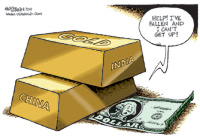Greg Hunter
USA Watchdog
At the beginning of this month, the G20 met in France to try to find a way to solve the European sovereign debt crisis. It ended with world leaders in disarray over a way to come up with a solution.
At first blush, it appears that nothing of any importance came of the meeting of the 20 leading economies of the world, but that is not the case. It was widely reported the G20 came up with the idea that Germany might put up its gold reserves to back a bailout fund called the European Financial Stability Facility or EFSF.
Of course, Germany, with its more than 3,400 tonnes of gold (number 2 in the world), quickly shot that idea down. End of story? Quite the contrary–the gold story is just beginning to get interesting.
You see, the G20 did something accidentally that was very important, and that was confirm that gold has a place in the monetary system, especially in times of extreme turmoil.
Why doesn’t the EU use sovereign bonds to back the EFSF? They are considered a store of value and are held as reserves in many European banks. The simple answer is the world is waking up to the fact that debt can’t back up debt.
Europe finds itself in a tough spot, and the leaders there know it. Reuters reported Monday, German Chancellor Angela Merkel said, “Europe is in one of its toughest, perhaps the toughest hour since World War Two,” she told her Christian Democrats, saying she feared Europe would fail if the euro failed and vowing to do anything to stop this from happening.” (Click here for the complete Reuters story.) Well, anything but put Germany’s gold up as collateral. Maybe Chancellor Merkel will be the next leader to exit the European stage? Who knows, but what I do know is that gold is once again going to become an important part of the world monetary system.
In a new book called “Currency Wars,” Wall Street insider Jim Rickards examines how countries try to get out of financial trouble by devaluing their currencies. Rickards says, “Today, as yesterday, countries are attempting to devalue their way out of trouble. Following the strategy of beggar-thy- neighbor, the U.S., Europe, China and Japan all want to weaken their currencies.
The flaw in the tactic should be clear. “Not everyone could cheapen at once,” Rickards writes.
“The circle still could not be squared.” (Click here to read a book review by Bloomberg.) Rickards predicts the U.S. dollar’s future is not bright, and if there were a “catastrophic collapse of investor confidence,” the dollar’s buying power could suffer suddenly and dramatically in a global sell off.
linkwithin_text=’Related Articles:’



Be the first to comment on "It’s All About Gold Now"